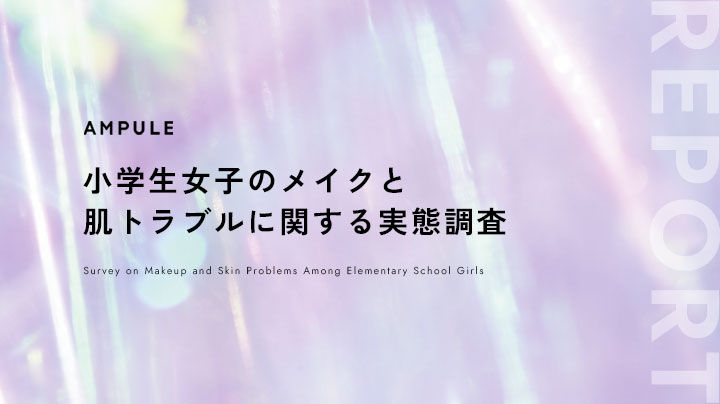ARTICLE
Insight
From 20s to 60s! Where Men’s Beauty is Today, as Seen in a Survey of Attitudes<ampule magazine Vol.07>
This survey was excerpted from the June 2023 issue of ampule magazine Vol. 07.
To read the corresponding article and the full magazine, please visit the back issues of the electronic version of ampule magazine.
▼ampule magazine
https://ampule.jp/magazine/
ampule magazine Vol.07「The Truth About Men’s Beauty」
The theme of “ampule magazine Vol. 7” is “The Truth About Men’s Beauty. With contents such as “Self-Producer,” “Beauty Geek Men,” and “Men’s Attitude Survey,” the magazine delves deeply into men’s beauty, which has now become commonplace.
<Survey Summary>
Survey by Trenders
Survey period: January 19, 2023
Subjects: 4,839 men in their 20s to 60s
Method: Internet survey
Men’s beauty” has been covered in various media, but most of them seem to focus on the younger generation, especially those in their 10s~20s. But is it only the younger generation that is interested in beauty? What kind of interest do they have? We would like to analyze where men’s beauty in Japan is now and where it will go in the future through a survey of each generation up to the 60s.

<Percentage of “yes” answers>
20’s:42.9%
30’s:42.2%
40’s:36.8%
50’s:25.7%
60’s:19.5%

【Men’s Beauty】
<Percentage of respondents who answered “likeable>
20’s:59.6%
30’s:52.0%
40’s:42.5%
50’s:28.1%
60’s:21.1%
A fairly large difference in favorability was revealed among the generations. Looking at the difference in points among the generations, the 40-50s group has the largest difference, and this seems to be the borderline where they can identify themselves as “men’s”.
【man who is attractive to women】
<Percentage of respondents who answered “likeable>
20’s:56.1%
30’s:46.3%
40’s:33.5%
50’s:21.5%
60’s:14.9%
Even more than “men’s beauty,” there are differences in the impressions felt by different generations. Perhaps because the expression “men” evokes a sense of youth, only about 30% of those in their 40s have a favorable impression of the term. While it is a word that is difficult for middle-aged and older people to personalize, nearly 60% of those in their 20s have a favorable impression of it, suggesting that it is effective as a word to limit the target audience.

【personal appearance】
<Percentage of respondents who answered “likeable>
20’s:71.2%
30’s:73.9%
40’s:77.8%
50’s:79.9%
60’s:83.6%
Unlike the “men’s beauty” and “beauty men” categories, there is almost no generational gap between the two. In fact, the percentage of respondents who favor the term “beauty men” increases with the age of the respondents, suggesting the possibility of increasing the interest in beauty among senior men, depending on communication, by focusing on the high interest in grooming even in their 60s.
【cleanliness】
<Percentage of respondents who answered “likeable>
20’s:72.0%
30’s:74.8%
40’s:78.4%
50’s:82.5%
60’s:87.3%
The same trend as for “personal appearance” is evident, with a higher percentage of those in their 50s and 60s expressing a favorable impression than for “personal appearance. It is possible that various physical changes due to aging may be influencing their awareness.

【自己プロデュース】
<Percentage of respondents who answered “likeable>
20’s:54.0%
30’s:49.1%
40’s:44.4%
50’s:41.0%
60’s:40.6%
Here, too, there was not such a large gap between generations. It turns out that even the middle-aged and older generations seem to have some interest in “how to present themselves.
【セルフブランディング】
<Percentage of respondents who answered “likeable>
20’s:53.6%
30’s:48.3%
40’s:42.4%
50’s:35.8%
60’s:34.8%
Although similar in meaning to “self-produce,” the difference between generations was slightly larger for this term, which, combined with the spread of SNS, has become widespread among the younger generation, but may be less familiar to the middle-aged and older generation. It is also possible that the high proportion of katakana words may make it easier for the older generation to be less accepting of these words.
This may also be a possibility.
It was found that the resistance of the middle-aged and older generation is very high when it comes to words that lean toward youth and beauty. Words such as “men’s beauty” and “beauty men” are new and frequently used in the media, but if used too easily, they may alienate those who are potentially interested in beauty. However, as the survey results show, all generations are highly interested in “cleanliness” and “self-purification,” areas where beauty can demonstrate its true value. By being conscious of communication that is not biased toward “beauty,” the future of men’s beauty may in fact expand.





